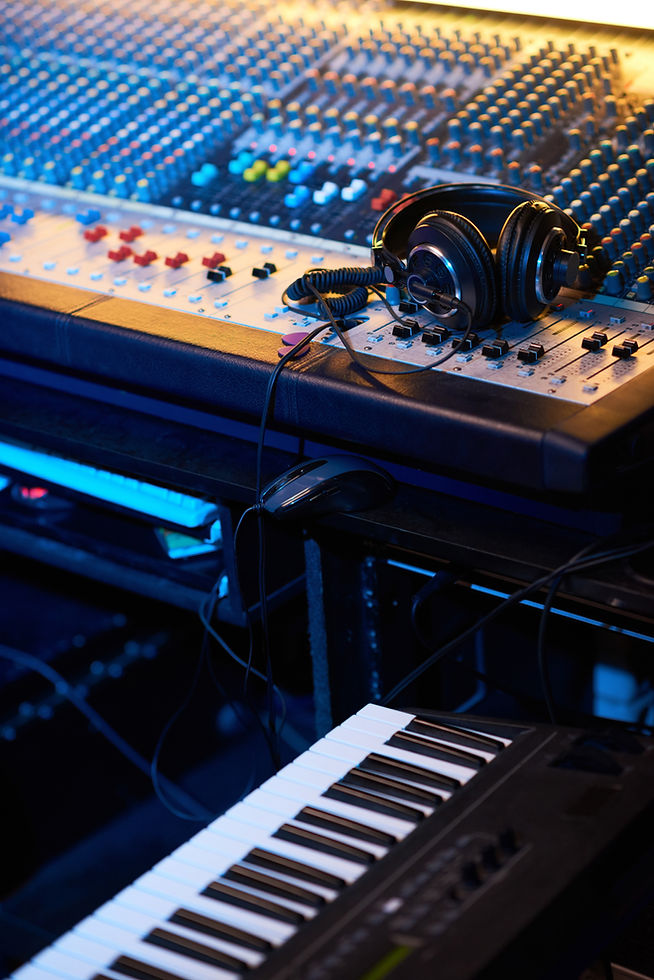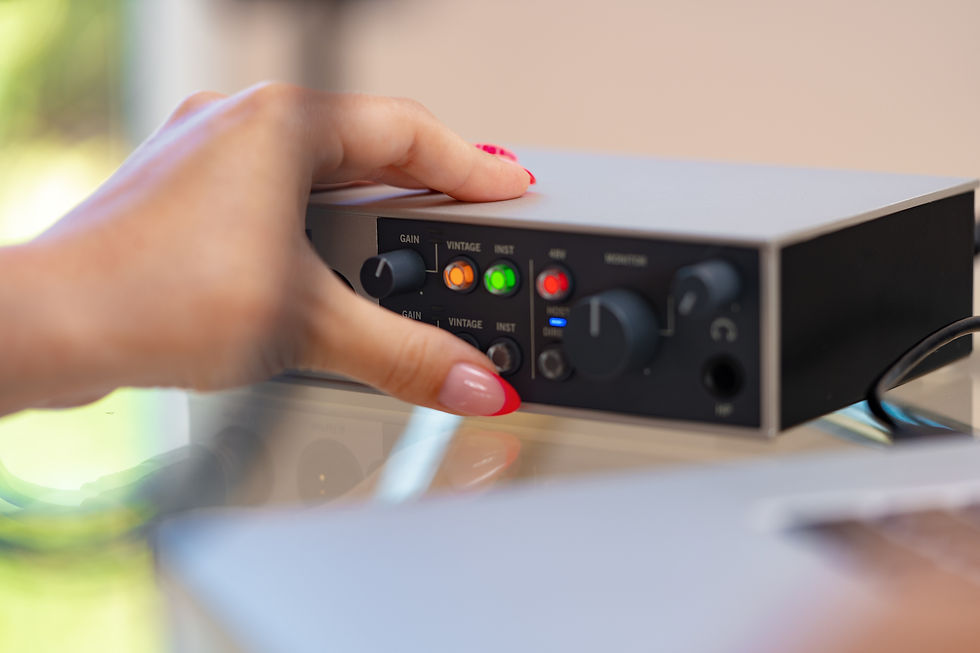
Essential Tools for Modern Music Production
- VINTAGE SOUNDSET

- Aug 17, 2025
- 4 min read
Creating music today is more accessible than ever, thanks to a wide range of tools designed to help artists bring their ideas to life. Whether you are composing beats, recording vocals, or mixing tracks, having the right equipment and software can make a significant difference in the quality and efficiency of your work. This guide explores the essential tools for music making that every modern producer should consider.
Key Tools for Music Making: Hardware Essentials
When starting with music production, hardware plays a crucial role in shaping your sound and workflow. Here are some must-have pieces of equipment:
Audio Interface
An audio interface is the bridge between your instruments, microphones, and computer. It converts analog signals into digital data and vice versa. Look for interfaces with low latency and high-quality preamps. Popular models include the Focusrite Scarlett series and Universal Audio Apollo.
MIDI Controller
A MIDI controller allows you to play virtual instruments and control software parameters. Keyboards with pads and knobs provide versatility. The Akai MPK Mini and Novation Launchkey are excellent choices for beginners and pros alike.
Studio Monitors and Headphones
Accurate sound reproduction is vital. Studio monitors like the Yamaha HS series or KRK Rokit provide clear, flat sound. Complement these with closed-back headphones such as the Audio-Technica ATH-M50x for detailed listening during recording.
Microphones
For recording vocals or instruments, a quality microphone is essential. Condenser mics like the Audio-Technica AT2020 are affordable and versatile. Dynamic mics such as the Shure SM58 are great for live vocals and certain recording situations.

Software and Digital Tools for Music Making
Software is the heart of modern music production. Digital Audio Workstations (DAWs) and plugins provide endless creative possibilities.
Digital Audio Workstations (DAWs)
A DAW is where you record, edit, and arrange your music. Popular DAWs include Ableton Live, FL Studio, Logic Pro X, and Pro Tools. Each has unique features, so choose one that fits your style and workflow.
Virtual Instruments and Plugins
Virtual instruments emulate real instruments or create entirely new sounds. Synthesizers, drum machines, and samplers are common types. Plugins also include effects like reverb, delay, and compression to enhance your tracks.
Sample Libraries and Sound Packs
High-quality samples can inspire creativity and speed up production. Look for diverse libraries that cover genres and instruments you want to explore. Websites like Vintage Soundset offer curated collections of sounds perfect for modern producers.

What Does a Beginner Producer Need?
Starting out in music production can feel overwhelming, but focusing on the essentials helps build a solid foundation.
Basic Hardware Setup
Audio Interface: A simple, reliable model like the Focusrite Scarlett Solo.
MIDI Controller: A compact keyboard with pads, such as the Akai MPK Mini.
Headphones: Comfortable, closed-back headphones for monitoring.
Software Choices
DAW: Choose a beginner-friendly DAW like FL Studio or Ableton Live Intro.
Plugins: Start with free or affordable plugins to learn effects and virtual instruments.
Learning Resources
Online tutorials and courses.
Community forums and social media groups.
Practice by recreating songs or beats you like.
Workspace Tips
Set up a quiet, comfortable space.
Use acoustic treatment if possible to improve sound quality.
Organize cables and gear to avoid distractions.

Advanced Tools for Professional Music Production
As skills grow, producers often expand their toolkit to include more specialized equipment and software.
Hardware Synthesizers and Drum Machines
Analog and digital synths add unique character. Popular models include the Moog Sub 37 and Roland TR-8S. These instruments offer hands-on control and inspire creativity.
Control Surfaces
Control surfaces provide tactile control over your DAW’s mixer and plugins. Devices like the Ableton Push or PreSonus FaderPort improve workflow and precision.
Outboard Gear
External compressors, equalizers, and effects units can add warmth and depth to your mixes. Brands like Universal Audio and SSL are industry standards.
Advanced Plugins and Software Instruments
Invest in high-end plugins for mastering, sound design, and mixing. Tools like iZotope Ozone and Serum synth are widely used by professionals.
Tips for Choosing the Right Music Production Tools
Selecting the right tools depends on your goals, budget, and style. Here are some tips to guide your decisions:
Define Your Needs: Are you producing electronic music, recording bands, or composing orchestral pieces? Your tools should match your genre.
Start Small: Build your setup gradually. Invest in quality over quantity.
Research and Test: Watch reviews, try demos, and ask for recommendations.
Consider Compatibility: Ensure hardware and software work well together.
Prioritize Workflow: Choose tools that inspire creativity and fit your working style.
By carefully selecting your equipment and software, you can create a productive and enjoyable music-making environment.
Exploring the world of music production tools opens up endless creative possibilities. Whether you are just starting or looking to upgrade your studio, the right combination of hardware and software will empower you to bring your musical ideas to life with clarity and style. For a curated selection of high-quality sounds and instruments, check out music production tools that can elevate your productions to the next level.
$0
80s Synth Wavetables
Product Details goes here with the simple product description and more information can be seen by clicking the see more button. Product Details goes here with the simple product description and more information can be seen by clicking the see more button
$0
ANALOG LAB V | SYNTHWAVE PRESETS
Product Details goes here with the simple product description and more information can be seen by clicking the see more button. Product Details goes here with the simple product description and more information can be seen by clicking the see more button
$24.5
CZ RETROWAVE | Arturia CZ V, CZ-101, VirtualCZ
Product Details goes here with the simple product description and more information can be seen by clicking the see more button. Product Details goes here with the simple product description and more information can be seen by clicking the see more button
$24.5
DREAMWAVES LAB | ARTURIA ANALOG LAB V PRESETS
Product Details goes here with the simple product description and more information can be seen by clicking the see more button. Product Details goes here with the simple product description and more information can be seen by clicking the see more button
$25
DREAMWAVES V1 | ARTURIA MINIFREAK PRESETS
Product Details goes here with the simple product description and more information can be seen by clicking the see more button. Product Details goes here with the simple product description and more information can be seen by clicking the see more button
$25
MASSIVE X | NEON VICE - SYNTHWAVE PRESETS
Product Details goes here with the simple product description and more information can be seen by clicking the see more button. Product Details goes here with the simple product description and more information can be seen by clicking the see more button
$0
PG-8X | Synthwave Starters FREE BANK
Product Details goes here with the simple product description and more information can be seen by clicking the see more button. Product Details goes here with the simple product description and more information can be seen by clicking the see more button
$25
SAURUS HYPERDRIVE | TONE2 SYNTHWAVE PRESETS
Product Details goes here with the simple product description and more information can be seen by clicking the see more button. Product Details goes here with the simple product description and more information can be seen by clicking the see more button
$19
SERUM 1 | SYNTHWAVETABLE VOL. ONE
Product Details goes here with the simple product description and more information can be seen by clicking the see more button. Product Details goes here with the simple product description and more information can be seen by clicking the see more button
$25
SERUM 2 | ANALOG TITANS | SYNTH & DRUM SAMPLES
Product Details goes here with the simple product description and more information can be seen by clicking the see more button. Product Details goes here with the simple product description and more information can be seen by clicking the see more button
$25
SERUM 2 | DREAM-MACHINE - SYNTH-POP VIBES
Product Details goes here with the simple product description and more information can be seen by clicking the see more button. Product Details goes here with the simple product description and more information can be seen by clicking the see more button
$0
SERUM 2 | SYNTHWAVE STARTER PACK
Product Details goes here with the simple product description and more information can be seen by clicking the see more button. Product Details goes here with the simple product description and more information can be seen by clicking the see more button
$20
TAL PHA JUNO | FUTUREWAVE - SYNTHWAVE PRESETS
Product Details goes here with the simple product description and more information can be seen by clicking the see more button. Product Details goes here with the simple product description and more information can be seen by clicking the see more button
$20
TAL-UNO-XL | Synthpop Volume I
Product Details goes here with the simple product description and more information can be seen by clicking the see more button. Product Details goes here with the simple product description and more information can be seen by clicking the see more button



















Comments